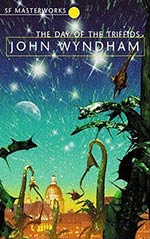
![]() BigEnk
BigEnk
9/6/2025
![]()
"When a day that you happen to know is Wednesday starts off by sounding like Sunday, there is something seriously wrong somewhere."
With this memorable line, John Wyndham's 1951 post-apocalyptic disaster novel The Day of the Triffids opens. The central character, Bill, wakes up in a hospital bed having seemingly missed the apocalypse all together, listening to eerily quiet streets of London outside his window. An iconic moment that has inspired so many that followed in both novel and film form, cementing its place as a 'classic' of the sub-genre. The Day of the Triffids has proven to be Wyndham's most enduring work, and fortunately for him, because this was the first of his works which he attached his real name to.
Bill discovers that he was one of the lucky few not blinded by a mysterious meteor shower the night before. Most Londoners now awkwardly shuffle the streets whimpering in fear, on the search for food and a place of refuge. The complicating and surprising factor for the blinded populace is the titular Triffids; a motile, enormous, and carnivorous plant with a deadly venom, which despite their mysterious origins were farmed for their superior oil. It doesn't take long for the escaped Triffids to multiply and prey upon unsuspecting humans, which they do with increasing fervor as the novel progresses.
The Day of the Triffids bares a lot of comparisons to John Christopher's The Death of Grass, published five years later. In the later, it is the extinction of a plant species that causes calamity - here, the introduction of a new one. Where as in the later, the main character John and his feamily head immediately into the countryside, the solitary Bill turns inward towards the heart of London. John has a goal in mind from the start; reaching his brother's defensible farm in the country. Bill's aims are far less defined. He rescues a woman from rape at the hands of her blind captor, and once they have a bracing shot of booze in a run-down bar, they meet a group of academics planning to start a society based on what is best described as objectivism/meritocracy... and forced polygamy.
Despite their top-billing, the Triffids themselves play but a small role in most of the book, outside of the fear they create in the characters. They are rather easily dispatched by an able-bodied, seeing person, and because most humans are hopelessly (often suicidally) incompetent without their sight, the sighted characters can easily take what spoils they want from the unmanned storefronts in London. This gives the characters ample time to speculate on what form society should take in this new paradigm, and it is here that we spend most of our time.
The events of the plot take Bill and his disaster bride-to-be Josella on what more-or-less amounts to a tour of the different cultural nuclei among the survivors. Along with the aforementioned objectivism that is assumed to be the most 'correct', we get glimpses of religious fundamentalism, a kind of neo-feudalism, and outright slavery of the sighted at the hands of the blind. As for the blind, most of the sighted choose to detach from them instead of showing the slightest of sympathy:
"Should we spend our time prolonging misery when we believe that there is no chance of saving the people (or ourselves) in the end?"
We are left to wonder how many of the morals and ideals common today are necessary, even prudent, for our potential as a species to be maximized. We are also left wondering how Wyndham can believe that the loss of sight will render someone completely dependent on others, and that, faced with that reality, many would rather kill themselves.
Wyndham is, on the surface, also commenting on the thin veneer that separates our modern culture from barbarism, wishing that we wouldn't conflate familiarity with stability. Both the Triffids themselves, and the plague that sweeps the populace that follows them, are creations of our own hubris in times of excess. Punishment for our sins perhaps? Though, the book is notably secular, clear on the fact that nobody (not even God, or the Americans) will eventually rescue the beleaguered bands of survivors. There's a palpable sense of post-WWII angst, and a real fear of the mounting pressure of the Cold War.
The central male characters lament western culture which they believe has fostered women into becoming dependent parasites. This is pared with Wyndham's insentient sexual objectification, and postulating that women should/will become broodmares for repopulation purposes. Despite Josella's basic competency and reflective personality, I'm not entirely impressed on this front, even given its publication date.
The Day of the Triffids was sadly a disappointment for me. Ignoring the questionable cultural hypotheses and rampant misogyny, Wyndham writes about these events with the cold emotional vacancy of an amateur reporter. The characterization could charitably be described as thin, the narrative meanders frequently, and the Triffids are underutilized in my opinion. Yes, there are moments of forlorn, and melancholic prose that reminded me of why I enjoyed The Chrysalids, and perhaps my disappointment may lay partially at the feet of its positive reputation, but the fact is that I know he can/did do better than this.